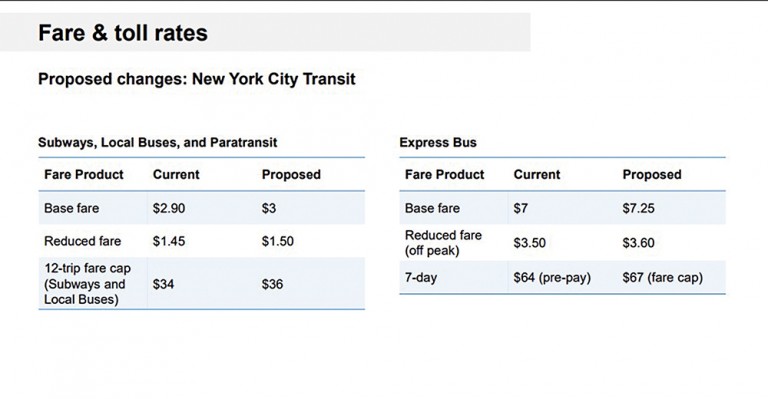By Michael V. Cusenza
Thanks to increased ridership, lower operating expenses, and savings goals, the Metropolitan Transportation Authority recently announced that it is postponing fare and toll increases to January, when the cost of a ride on the bus or train is expected to cost customers $3.00, an increase of 10 cents from $2.90. Express bus fares would rise to $7.25, from the current $7.00. The reduced-fare would remain at half-off the base fare, rising from $1.45 to $1.50. Single-ride tickets on subways and buses will increase to $3.50 from the current $3.25. The fee for a new OMNY card would increase to $2 when the MetroCard is no longer accepted for fare payment later in 2026.
The authority last week released its July Financial Plan showing continued balanced operating budgets for 2025 and 2026 and narrowed deficits in 2027 and 2028. Over the last year, the MTA has narrowed the deficit by $198 million. Robust summer ridership on the subway and railroads the and has resulted in higher fare revenue projections this year. And overall operating expenses are below the amount that had been budgeted. The July Financial Plan reaffirms the Authority’s previously forecasted $500 million annual cost savings beginning in 2025.
For the RFK, Whitestone, Throgs Neck, Verrazzano Bridges and the Queens-Midtown, Hugh L. Carey Tunnels the proposed toll would go from $6.94 to $7.46. The Henry Hudson Bridge would go from $3.18 to $3.42 and Cross Bay and Marine Parkway Bridges would go from $2.60 to $2.80.
The July plan forecasts approximately $50 million less in deficits for Fiscal Year 2027 and 2028, totaling $98 million. This is in addition to the $100 million announced in November, totaling $198 million less in deficits than this time last year. The projected deficit for Fiscal Year 2029 is $428 million. These funding shortfalls are in large part due trip growth in Paratransit.
The MTA has also proposed a series of fare and ticket policy changes designed to simplify the array of offerings in order to accentuate the affordability of New York City Transit’s subways and buses, the Long Island Rail Road, the Metro-North Railroad. These changes are pursuant to the 2025 Budget approved by the MTA Board in December 2024. Updates are designed to simplify the fare structure and allow customers to automatically receive the best possible value. They accompany modest proposed fare and toll rate increases that keep pace with inflation, as they have every other year since 2009.
If approved by the MTA Board in the fall, the changes would go into effect in January, 2026.
“I’m proud that the MTA, by far America’s biggest and busiest transit agency, also remains the most financially stable thanks to strong summer ridership and ongoing efforts to fight fare evasion,” said MTA Chairman and CEO Janno Lieber. “Kudos to Gov. [Kathy] Hochul and our partners in Albany, and also to the MTA team that has found ways to save $500 million per year, even as we continued to increase subway, bus and commuter rail service.”

